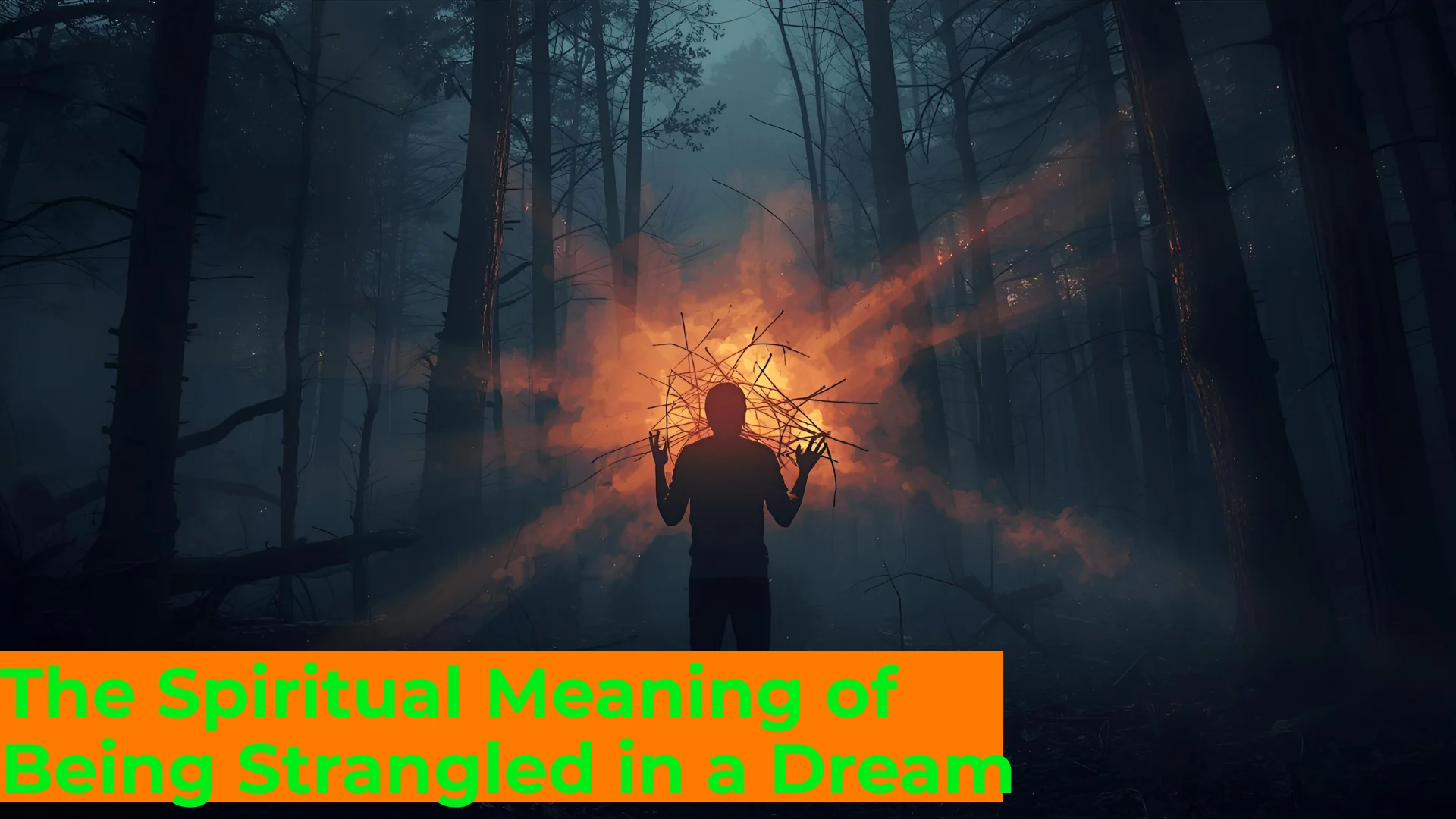Have you ever jolted awake from a dream where you were being strangled? The sensation can be terrifying—your chest tight, your breath stolen, and your body frozen in fear. Dreams of being strangled often leave a lingering heaviness, almost as if the dream followed you into waking life.
But what if these unsettling visions were more than just nightmares? What if they carried symbolic, spiritual, and psychological messages meant to guide you toward healing and transformation? In dream language, strangulation is not merely about violence—it often represents silenced voices, suppressed emotions, blocked energy, or spiritual awakenings.
In this article, we’ll journey through the historical roots, cultural interpretations, psychological theories, and spiritual symbolism behind dreams of being strangled. Along the way, we’ll uncover how these dreams might serve as portals for growth, resilience, and deeper self-awareness.
📜 Historical & Anthropological Background
Ancient Beliefs About Dreams
- Babylonian & Egyptian Cultures believed that dreams were messages from the divine. A strangling dream might have been seen as an omen of evil spirits or curses.
- In Greek mythology, suffocating or strangling figures often symbolized struggles with fate—a sign that destiny was pressing down too heavily on the dreamer.
Anthropological Context
- In many indigenous traditions, breath represents life force or spirit. To dream of losing breath meant a disruption of harmony between the self and the natural world.
- Some African tribal societies interpreted strangling dreams as ancestral warnings, urging the dreamer to stop destructive habits or reconcile with family.
Spread of the Symbolism
As cultures intermingled, interpretations expanded. By the Middle Ages in Europe, strangulation dreams were often associated with witchcraft or demonic possession, while in Eastern traditions, they came to symbolize blocked chakras or karmic entanglements.
🧠 Psychological & Healing Interpretations
Jungian Perspective
Carl Jung often emphasized dreams as windows into the unconscious. From a Jungian view:
- Being strangled represents suppression of the “true self.”
- It reflects moments when the ego and shadow self are in conflict.
- It may also symbolize an inner voice being silenced—creativity, truth, or personal freedom.
Modern Psychology
- Anxiety & Stress: Strangling dreams can arise when the dreamer feels overwhelmed, trapped, or unable to express themselves in waking life.
- Trauma Responses: People with past experiences of abuse or suffocation may re-live sensations in dreams as part of the subconscious healing process.
- Communication Blocks: The throat is linked to expression. These dreams may point toward difficulty speaking up or setting boundaries.
Healing Pathways
- Breathwork & meditation can help restore a sense of inner calm.
- Journaling or therapy allows expression of silenced emotions.
- Spiritual practices like chanting or energy healing can unblock the throat chakra, bringing freedom to one’s voice.
🌙 Spiritual & Religious Perspectives
Native Spirituality
Among many Native American traditions, breath is the essence of spirit. To dream of strangulation may mean:
- A disconnect from ancestors or spiritual guides.
- A warning to return to balance with nature.
- An initiation into greater spiritual strength through struggle.
Christian & Biblical Views
- The Bible often associates breath with the Spirit of God. Being strangled in a dream could symbolize spiritual warfare, temptation, or demonic interference.
- Alternatively, it may be a call to surrender burdens and reclaim spiritual life.
Eastern Spirituality
- In Hinduism and Buddhism, strangulation dreams may be connected to the Vishuddha (throat chakra)—representing blocked communication or truth.
- Taoist teachings may interpret it as an imbalance of Qi (life force energy).
Modern Spirituality
New Age perspectives often frame strangling dreams as a wake-up call. The dreamer may be urged to:
- Speak their truth.
- Release toxic ties.
- Reclaim spiritual breath as a path to empowerment.
🔮 Deeper Symbolism of Strangulation in Dreams
- Strength & Resilience: Enduring a strangling dream may symbolize hidden resilience.
- Suppression & Liberation: It often reflects feelings of being silenced but also the potential to break free.
- Protection: In some traditions, the struggle represents the soul’s fight against harmful forces.
- Inner Healing: Confronting suffocating imagery may push the dreamer toward self-expression and emotional release.
⚖️ Gender-Based Meanings
Masculine Interpretations
- For men, being strangled in dreams may symbolize pressure to meet societal expectations, or struggles with authority and power.
- It may also reflect unexpressed aggression or frustration.
Feminine Interpretations
- For women, it may reveal silenced emotions, suppressed intuition, or patriarchal oppression.
- Strangling dreams can also be linked to healing the feminine voice and reclaiming spiritual authority.
🏹 Placement & Body Location Symbolism
While strangulation dreams focus primarily on the throat and neck, they may also symbolically extend to other parts of the body:
- Neck/Throat: Suppressed voice, blocked truth.
- Chest/Heart: Emotional suffocation, lack of love.
- Head: Mental overload, overthinking.
- Hands/Arms: Restriction of freedom, lack of agency.
🎨 Design & Color Symbolism in Dream Imagery
Sometimes, strangulation dreams come with visual colors, objects, or energies:
- Red 🔴 = Passion, anger, or life force blocked.
- Blue 🔵 = Peace, but also emotional suppression.
- Black ⚫ = Fear, shadow work, hidden trauma.
- White ⚪ = Purification, spiritual awakening after struggle.
- Green 🟢 = Healing energy, growth after suffocation.
⚔️ Cultural Debate: Respect vs. Appropriation
While interpreting strangulation dreams through Native or cultural traditions, it’s vital to approach with respect. Misusing or appropriating sacred interpretations can cause harm. Instead:
- Honor original sources.
- Acknowledge cultural roots.
- Adapt lessons with humility and gratitude.
🌟 Real-Life Stories & Reflections
- A woman shared that recurring strangling dreams ended only after she began speaking up in her marriage, finding her voice after years of silence.
- A man reported that his dreams of suffocation appeared during career burnout, eventually guiding him to leave a toxic job.
- Another person described strangulation dreams during spiritual awakening—interpreting them as ancestral voices urging change.
These stories remind us: dreams reflect inner truths we may ignore in waking life.
❓ FAQs About Strangulation Dreams
1. Are strangling dreams a bad omen?
Not always. They often symbolize suppressed emotions or spiritual transformation rather than literal danger.
2. Do these dreams mean I’m in physical danger?
Rarely. They are more symbolic than predictive. If anxiety persists, seek professional guidance.
3. Can strangling dreams be linked to sleep paralysis?
Yes, many people report similar sensations during sleep paralysis episodes, blending body and dream imagery.
4. How can I stop recurring strangling dreams?
Explore journaling, therapy, meditation, or energy healing. Finding your voice in waking life often reduces them.
5. Do cultural backgrounds change dream meaning?
Yes—interpretations vary widely, from spiritual warnings to psychological metaphors.
🌅 Conclusion: From Suffocation to Liberation
Dreams of being strangled are undeniably unsettling, yet they hold profound symbolic weight. They remind us of the sacredness of breath, the importance of expression, and the courage it takes to free ourselves from invisible chains.
If you’ve had such dreams, consider them an invitation—not to fear, but to heal. They may be asking you to:
- Unblock your voice.
- Release toxic pressures.
- Reclaim spiritual balance.
Ultimately, strangulation dreams can serve as soul-level catalysts—pushing us from suffocation into liberation, from silence into empowered truth. 🌌


